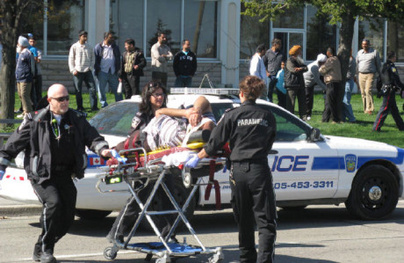 |
| Paramedics take an injured man away from the scene of a clash between rival groups at the Sikh temple at Glidden Rd. in Brampton on Sunday. |
Inderjit Singh Bal, who led a conclave to discuss the roots of last month’s violent fights at two temples, says shrines need new governance rules that ensure democratic accountability.
Perturbed by a storm of bad publicity after last month’s violence at two Sikh temples in Brampton, community leaders and thinkers say the lack of proper laws governing their shrines is leading to factional fights for control of the institutions and the money at their disposal.
A recent conclave on the issue in Brampton was attended by about 500 Sikhs, including Harinder Takhar, Ontario’s Minister of Government Services. The consensus was that placing Sikh shrines under a modified Ontario Corporations Act is the only way to end factional temple violence, according to conclave leader Inderjit Singh Bal.
Currently, most of the Sikh temples in Greater Toronto are run by trusts controlled by a few families or coteries, denying any role for the ordinary Sikhs who, as devotees, are the main source of income for these shrines. The Dixie Road Gurdwara brings in as much as $2-million in offerings annually.
The conclave will ask advice from Sikh lawyers, who have knowledge of both laws and traditions, to propose amendments to the Corporations Act, Mr. Bal said.
“All this violence is about controlling Sikh temples,” Mr. Bal said. “This has marred the image of the whole Sikh Canadian community. It has hurt us just like the 1984 events. We cannot take it any longer and have decided to become the voice of the common people. We want Sikh temples to be brought under a modified Corporation Act so that there is no place for factional fights and violence.”
Q: What are the loopholes in the current system governing Sikh temples that are leading to violence?
A: The problem is the current Corporations Act which covers Sikh temples. This act is basically meant for businesses. So, in a way, this act has turned the shrines into businesses.
Most of the Sikh temples are currently being run by trusts controlled by families or friends. These trusts make their own constitution to run these places as they like. There is no accountability for the money which devotees offer at these shrines. There are no rules for membership. They can give or deny membership to anyone. The government has to intervene to act.
Q: What can the government do?
A: It has to amend the Corporations Act so that Sikh shrines falling under it are run democratically. There should be rules for membership and fixed terms for office-bearers. Their management should be accountable to the Sikh community, which is not the case now. That’s why you witness ugly factional and political fights for control of these cash-rich religious institutions.
Q: What was the mood like at the conclave?
A: More than two dozen people spoke at the conclave. Everyone was very angry over all the bad publicity we have received because of the actions of a few people. We want them to be brought to justice. Minister Takhar, who came as an ordinary Sikh, was pained by the violence. He wanted politics and politicians to be kept out of shrine affairs.
Q: Looking ahead, what is your agenda?
A: It is just the beginning, and we will build it into a people’s movement so that our efforts end up in reforms at Sikh temples. As a neutral group with no ties to any shrine, we will hold public meetings and seminars at public places to give voice to the common Sikh. We will also invite the leaders of Sikh shrines to answer people’s questions. Sikh scholars will also be invited to share their feelings with the common people. We hope that the government will intervene to put in place an act which streamlines the functioning at Sikh shrines. The Sikhs don’t want the repeat of what happened last month.
Special to the Globe and Mail

